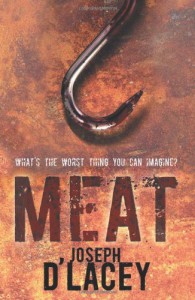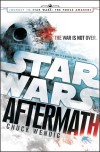Meat
 Joseph D'Lacey was someone who I decided to read based on the cover blurb by Stephen King. That blurb wasn't on Meat, though (it was on Black Feathers), and as I looked more at the book I bought, I realized that Stephen King thought that D'Lacey rocks due to a different novel, so I decided to read that one first. It didn't hurt that it sounded like it would be a good, visceral horror novel.
Joseph D'Lacey was someone who I decided to read based on the cover blurb by Stephen King. That blurb wasn't on Meat, though (it was on Black Feathers), and as I looked more at the book I bought, I realized that Stephen King thought that D'Lacey rocks due to a different novel, so I decided to read that one first. It didn't hurt that it sounded like it would be a good, visceral horror novel.Visceral it is. You get the feeling from the cover, the title, and the back cover description what the meat's going to be, so D'Lacey doesn't waste any time in getting you to that point. It's people. Humans. The characters view and consider them as nothing more than we do cattle, but the meat is people. This premise alone seems to disturb some people more than others, but just to make sure that everyone has the same response to the idea, D'Lacey goes to great lengths to describe how the people are treated and processed, from birth to cutlets. In fact, the first third of the novel is just about that. As a result, the novel relies a little too heavily on the "humans as meat" thing to convey the horror. More specifically, the horror lies in the "here's what they do to cattle to process them into meat; see how horrible it is when we apply those same principles to people?" aspect of it all. I'm not sure if D'Lacey set out to write the Vegan Manifesto, but it sure does read like he did.
The characterization felt a little weak, too. Magnus, the antagonist and the owner of the meat processing plant, was a bit too Snidely Whiplash in the end. He was evil just to be evil; he wasn't given any clear motivation, other than being power- and money-hungry. Shanti, the protagonist, was developed a bit more, but even he felt a little too broadly painted. There was definitely more of a reason to care about him than there was with anyone else in the story, and he had a proper motivation to inspire him toward his actions, but there was still some disconnect between me and him. I still felt like I was watching him from a distance instead of being right there with him for his journey.
The story takes an interesting turn about halfway through, shifting from the intimate details of the meat-processing factory to the cattle themselves. D'Lacey characterizes them as Shanti recognizes that they're people, too. They come off as being noble victims, like how Native Americans have been portrayed in fiction in the past, where they support each other in life and in death, which is also evidence of some weak characterization, but the theme at least felt worthwhile.
I wish the book felt more readable, but as I neared the end of the novel, I was more ready for it to be over than I was interested in seeing what would happen next. It seemed like there was only one way the story could go, and that's where it wound up, twist revelation and all. It felt like a horror novel from the '80s or '90s, both in its writing style and its content, but it lacked the drive that I remember those novels having. Judging by the ratings of other readers, though, it appears that my dissatisfaction with the story is unique to me.






